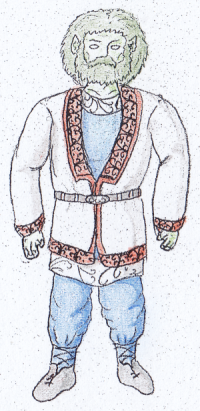Maþúlans
Maþúlic: Maþúlels /maːθuːlɛls/
Erenic: Maþúlóz /maːθulouːz/ Þamtic: Maþújó /maːθujouː/ Þiðic: Vaþóhje /vaθouːçɛː/ Númric: Malþólór /maːlθouːlour/
The maþúlans1 are one of the main groups of Southlandic Elves which emigrated from western Jælondis to the Southlands to escape the devastation of the Fell Wars some forty years ago, along with the Avóðans and Þiðans. Maþú, their original homeland, was located in what is now the northwestern part of Amþax, the wasteland left by the war. Most now live in the former maþúlan colony of Fjún or the country of Númra, both located in the northern Southlands.
While the maþúlan government in exile has made numerous attempts at reclaiming the old territory from undead beings left by the war, certain aspects of their culture have become increasingly obscure or outright lost as the younger generation has adapted local fjúnan language and customs to their own, if not outright replaced them.
Maþúlan shrines originally hired arctolatrist warriors to guard them, whose role ended after the maþúlans developed their own martial arts derived from the arctolatrist tradition and began training their own guardians. In Ijarta, capital of Maþú, one of these styles became the basis for ceremonial dances performed at the new year's festival.Ijótis Þvam: Represented maþúlans at the Ötera Conference.
Erenic: Maþúlóz /maːθulouːz/ Þamtic: Maþújó /maːθujouː/ Þiðic: Vaþóhje /vaθouːçɛː/ Númric: Malþólór /maːlθouːlour/
The maþúlans1 are one of the main groups of Southlandic Elves which emigrated from western Jælondis to the Southlands to escape the devastation of the Fell Wars some forty years ago, along with the Avóðans and Þiðans. Maþú, their original homeland, was located in what is now the northwestern part of Amþax, the wasteland left by the war. Most now live in the former maþúlan colony of Fjún or the country of Númra, both located in the northern Southlands.
While the maþúlan government in exile has made numerous attempts at reclaiming the old territory from undead beings left by the war, certain aspects of their culture have become increasingly obscure or outright lost as the younger generation has adapted local fjúnan language and customs to their own, if not outright replaced them.
Culture
Apparel
Maþúlan clothing is similar enough to fjúnan styles that distinguishing the two can be difficult, with the main difference being a preference for intricately embroidered designs around the neck on jackets.Religion
Traditional maþúlan religion is a form of dualistic Pyrolatry, with centers of worship being shrines housing eternal flames, tended by priestesses who also lead ceremonies. In Maþú, these fire were traditionally lit either using a focused beam of light via a large lens or by casting fire magic on the sanctified fat of a sacrificed animal, though in Fjún the latter method is now only used due to the weaker sunlight there. Various rituals require torches, braziers or candles lit by these sacred flames and the resulting ashes are sometimes smeared on people or objects to bless them.Maþúlan shrines originally hired arctolatrist warriors to guard them, whose role ended after the maþúlans developed their own martial arts derived from the arctolatrist tradition and began training their own guardians. In Ijarta, capital of Maþú, one of these styles became the basis for ceremonial dances performed at the new year's festival.
Notable maþúlans
1Original icelandic: Maþúlar, singular: Maþúli.
Parent ethnicities








Comments